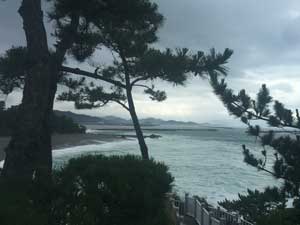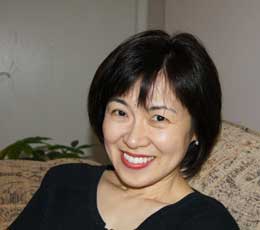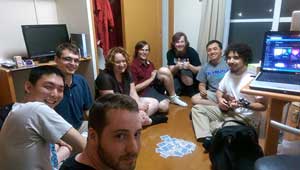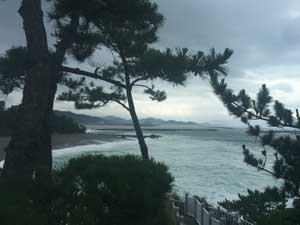 KINGSTON, R.I. – Sept. 3, 2015 – Alexander Toro-Maradiaga grew up in the Ocean State, but was never fond of seafood – until he studied this summer in Japan.
KINGSTON, R.I. – Sept. 3, 2015 – Alexander Toro-Maradiaga grew up in the Ocean State, but was never fond of seafood – until he studied this summer in Japan.
The University of Rhode Island senior was blown away by the sushi and other dishes made with fish plucked from the sea the same day. “It was amazing. Everything was so fresh.”
But the food wasn’t the only thing that impressed him during his six weeks at Kochi University on Shikoku, one of the four main islands that make up the country. He also fell in love with the people.
“Everyone was so friendly,” he says. “They help you and honestly care. I felt like I could live there.”
He just might. After graduating from URI next year with a double major in secondary education and English, he hopes to return to Japan to teach English. “That’s my dream.”
 URI is expanding its study abroad programs, and now it can add Japan to its list.
URI is expanding its study abroad programs, and now it can add Japan to its list.
Toro-Maradiaga was among 11 URI students who studied at Kochi University from mid-June to late July, taking classes in Japanese, as well as the country’s business practices, history and culture. Two of those URI students remained to continue their studies this fall. A student from Kochi is also studying at URI this year.
URI is improving its Japanese program, thanks to Japanese-born Masako Hoye, of Kingston, a URI lecturer hired a year ago to teach Japanese language and culture classes. This fall, 88 students are taking three first-year Japanese language classes, and 30 students are taking a course in Japanese culture, as well as the language. Hoye says about 40 students are getting a minor in Japanese.
URI and Kochi University also signed a “memorandum of understanding” in May for a semester or year-long student exchange program – a partnership that Hoye cultivated. Hoye says that one day URI would like to create an international engineering program with Japan.
Raised in the town of Kokura on Kyushuu island, Hoye grew up in a traditional Japanese family. She is married to an American professor, and they raised two children who are fluent in English and Japanese.
Hoye has also taught at the University of North Texas, Bucknell University, Wittenberg University, Colby College and Middlebury. She has a doctorate in linguistics from Colorado University, Boulder.
 “Japan is a clean and safe country with highly-developed technology,” she says. “One of the things that makes the country fascinating is that it’s a blend of old traditions with a high-tech modern life. Our program at URI is growing, and that’s very exciting.”
“Japan is a clean and safe country with highly-developed technology,” she says. “One of the things that makes the country fascinating is that it’s a blend of old traditions with a high-tech modern life. Our program at URI is growing, and that’s very exciting.”
Toro-Maradiaga, of Cumberland, is no stranger to the world. His father’s parents are from Ecuador, and his mother was born in Honduras. Toro-Maradiaga spent summers in those countries, and has also traveled to Georgia, near Turkey.
He is fluent in Spanish. On a whim, he decided to study Japanese and was quickly charmed by it. “There’s something mysterious about the language – and people,” he says. The summer program gave him a chance to immerse himself in the culture.
His impressions: Japan is very westernized; women are more outgoing than men; the ocean water is warm; people are polite; public transportation is excellent; karaoke really is a popular pastime; and the meal portions are smaller than in America. Tokyo is overcrowded and too fast-paced, he says, and people are shorter than he expected. At 5 foot 7 inches, Toro-Maradiaga says he was 3 to 4 inches taller than most.
Noah Davis, a URI senior from Wakefield, also appreciated the kindness of the people – young and old. One example: he could leave his bike unlocked and no one would steal it.
“There’s very little petty crime,” he says. “It’s shameful to steal something over there.”
He also climbed the tallest mountain in southern Japan, Mount Ishizuchi, passing Shinto pilgrims along the way. He’s studying computer science, but also might return to Japan after he graduates to teach English.
“It was a great trip,” he says. “Great food, nature, people. It’s different from the United States. People just flow with things in Kochi, and that’s nice.”
Tyler Conlan, a sophomore from Newport who is also studying computer science, says he, too, would like to return to Japan. He liked the focus on collective thinking that emphasizes the group rather than the individual.
“I haven’t met kinder people in my life,” he says. “It was a wonderful experience.”
Pictured above:
Masako Hoye, a URI lecturer in the Japanese language and culture. Photo courtesy of Masako Hoye.
URI students at Kochi University, from left to right, Noah Davis, Grant Sherman, Tyler Conlan, Hailee Richesin, Christopher Glifort, Matt Paquette, Alex Toro-Maradiaga and Timothy Tierney. Photo by Noah Davis.

